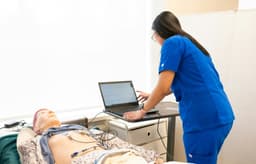Studying nursing in Australia is an exciting opportunity for international students seeking world-class education, practical clinical training, and global career pathways. However, understanding the financial requirements is essential for effective planning. Tuition fees, accommodation, food, transport, and personal expenses can add up quickly, so having a clear picture of your annual costs is vital. This comprehensive guide provides detailed 2025 estimates for living costs, city-specific breakdowns, and tips to help nursing students manage their finances while studying in Australia.
Tuition Fees for Nursing in Australia (2026 Intakes)
Tuition fees vary depending on the program, university, and location. Here's an overview:
Bachelor of Nursing: AUD $32,000 – $42,000 per year
Master of Nursing: AUD $36,000 – $50,000 per year
PhD in Nursing: AUD $35,000 – $45,000 per year
Example Tuition Fees at Leading Universities:
| University | Program | Tuition (AUD/year) |
|---|---|---|
| University of Sydney | Bachelor of Nursing | 41,000 |
| Monash University | Bachelor of Nursing | 39,000 |
| University of Melbourne | Master of Advanced Nursing | 47,000 |
| QUT | Bachelor of Nursing | 36,500 |
| Deakin University | Bachelor of Nursing | 37,000 |
Tip: Tuition fees may increase annually by 2–5%. Always verify the latest figures before applying.
Additional Academic Costs
Beyond tuition, students should budget for other mandatory costs:
Overseas Student Health Cover (OSHC): AUD 500–700 per year (mandatory for student visas).
Textbooks & Study Materials: AUD 600–1,000 per year.
Uniforms & Nursing Equipment: AUD 200–500 (stethoscope, scrubs, shoes).
Clinical Placement Costs: Travel and accommodation may be required for some placements.
Average Annual Living Costs (2025 Estimates)
Living expenses vary depending on city, lifestyle, and accommodation choices. Typical costs include:
| Expense | Estimated Cost (AUD/year) |
|---|---|
| Accommodation | 10,000 – 20,000 |
| Food & Groceries | 4,000 – 7,000 |
| Transport | 1,500 – 3,000 |
| Utilities & Internet | 2,000 – 3,000 |
| Personal Expenses | 2,000 – 4,000 |
Minimum Living Cost Requirement: The Australian government requires proof of at least AUD $29,710 for annual living expenses when applying for a student visa.
Cost of Living by City for Nursing Students
Your choice of city in Australia can significantly impact your overall living expenses. While Adelaide was previously known for its affordability, recent data indicates that major cities like Sydney and Melbourne now offer more competitive living costs for international students. Below is a revised estimate of annual living expenses for international nursing students in various Australian cities (excluding tuition):
| City | Estimated Annual Living Costs (AUD) | Notes |
|---|---|---|
| Sydney | 27,000 – 32,000 | High living costs; rent and transport are expensive, but access to top healthcare facilities and part-time jobs is plentiful. |
| Melbourne | 24,000 – 28,000 | Slightly more affordable than Sydney; vibrant student life and good public transport. |
| Brisbane | 22,000 – 26,000 | Moderate cost city; popular with students seeking balance between urban life and affordability. |
| Perth | 21,000 – 25,000 | Lower cost of living compared to east coast; good opportunities for part-time healthcare roles. |
| Adelaide | 22,000 – 26,000 | Previously affordable; recent increases in rent and living costs have narrowed the gap with other major cities. |
Tip: While Adelaide remains a viable option for many students, it's essential to consider the recent cost increases when planning your budget. Cities like Perth and Brisbane may offer more competitive living expenses.
Cheapest Cities for Nursing Students in Australia
For international nursing students seeking to manage costs while studying in Australia, choosing smaller cities or regional campuses can offer substantial financial relief. Compared to major metropolitan areas like Sydney or Melbourne, these cities provide lower accommodation, transport, and general living expenses—often reducing overall costs by 20–30%.
Regional and Smaller Cities
Darwin
Lower rent and utility costs compared to southern capitals.
Smaller population means reduced daily expenses for groceries, transport, and leisure.
Access to tropical healthcare placements and practical training opportunities.
Hobart
Tasmania's capital offers affordable student accommodation and living costs.
Cost of public transport and utilities is generally lower than mainland cities.
Close-knit student communities help reduce social expenses.
Gold Coast
Popular among students for its beaches and lifestyle, yet cheaper than Brisbane or Sydney.
Affordable shared rentals and part-time work opportunities in tourism and healthcare sectors.
Offers access to both university campuses and practical nursing placements in hospitals.
Regional Campuses Near Melbourne or Brisbane
Many universities have regional branches that significantly reduce tuition and living costs.
Lower housing and commuting expenses than city campuses.
Opportunities for hands-on clinical training in smaller healthcare facilities.
Tip: Students willing to study outside major capitals can save significantly while still gaining quality education and accredited nursing qualifications.
Part-Time Work to Offset Living Costs
Balancing study and living expenses is a key consideration for international nursing students in Australia. To help manage costs, students are allowed to work up to 48 hours per fortnight during the academic semester and unlimited hours during semester breaks, providing an opportunity to earn income while gaining practical experience.
Typical Part-Time Opportunities for Nursing Students
Working part-time can also complement your nursing education by offering exposure to healthcare environments. Popular roles include:
Healthcare Assistant: Support nurses in hospitals, clinics, or aged care facilities. Tasks may include monitoring patients, assisting with daily activities, and maintaining hygiene standards.
Disability Support Worker: Provide care and assistance to individuals with disabilities, helping improve their quality of life while developing key communication and caregiving skills.
Aged Care Staff: Work in nursing homes or aged care facilities, assisting elderly residents with daily routines, mobility, and recreational activities.
Retail and Hospitality Roles: Flexible options in cafes, restaurants, or retail stores provide income while developing customer service, time management, and teamwork skills.
Income and Financial Benefits
Average Pay: AUD $22 – $28 per hour, depending on the role and location.
Financial Impact: Part-time work can significantly offset living expenses, covering costs such as accommodation, groceries, transport, and utilities.
Practical Experience: Healthcare-related roles allow students to gain hands-on experience, strengthen resumes, and enhance employability in the nursing field after graduation.
Tip: Combining part-time work with careful budgeting can make studying in Australia more financially manageable, while also providing valuable industry experience that supports future career growth.
Budgeting Tips for Nursing Students
Effective budgeting can make studying in Australia more affordable:
Share accommodation with fellow students to save on rent.
Use public transport passes or student travel discounts.
Cook meals at home instead of eating out frequently.
Take advantage of student discounts for food, entertainment, and shopping.
Apply for nursing scholarships to reduce tuition costs.
Track monthly expenses using budgeting apps to avoid overspending.
Consider second-hand textbooks or digital resources to save on study materials.
Total Estimated Costs (Tuition + Living)
Combining tuition and living costs, international nursing students should plan for:
| Program | Total Annual Costs (AUD) |
|---|---|
| Bachelor of Nursing | 55,000 – 65,000 |
| Master of Nursing | 60,000 – 70,000 |
| PhD in Nursing | 58,000 – 68,000 |
While Australia may be more expensive than some destinations, the high quality of education, global recognition, and strong career outcomes make it a worthwhile investment.
Get Started Today!
Studying nursing in Australia is a life-changing opportunity that requires careful financial planning. By understanding tuition fees, living expenses, city-specific costs, and strategies to offset expenses through part-time work and scholarships, international students can make informed decisions and pursue their dream career in healthcare.
Start planning your nursing journey in Australia today! Explore scholarships, budget-friendly cities, and part-time work options to make your study experience financially sustainable.
Contact us now to get expert guidance on funding, scholarships, and cost planning for your nursing degree in Australia.









